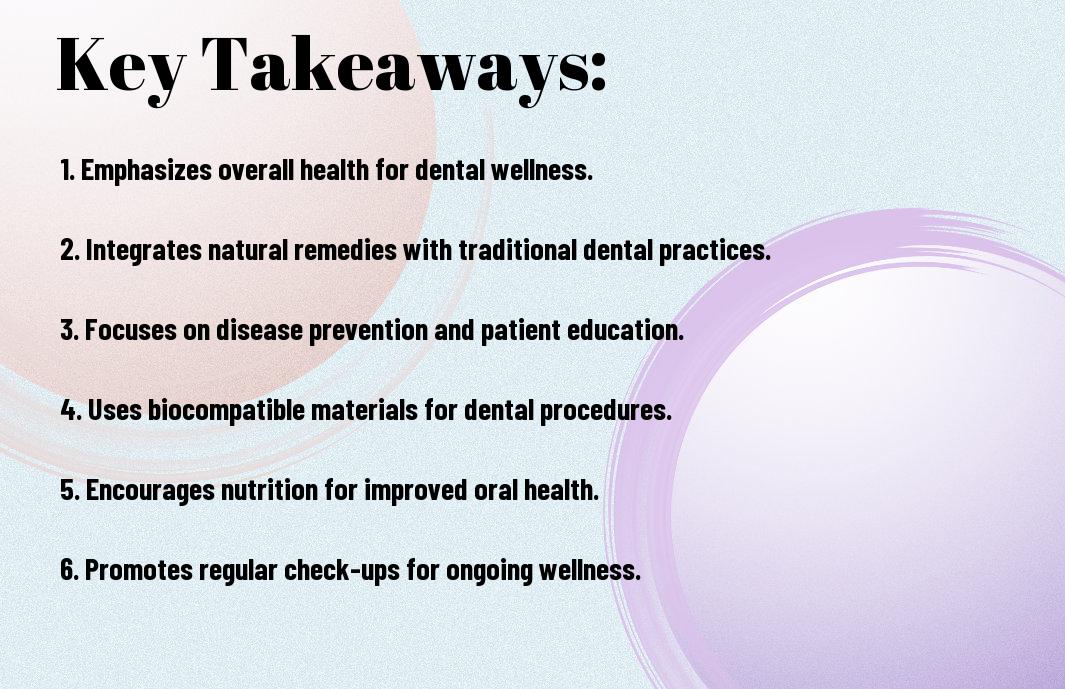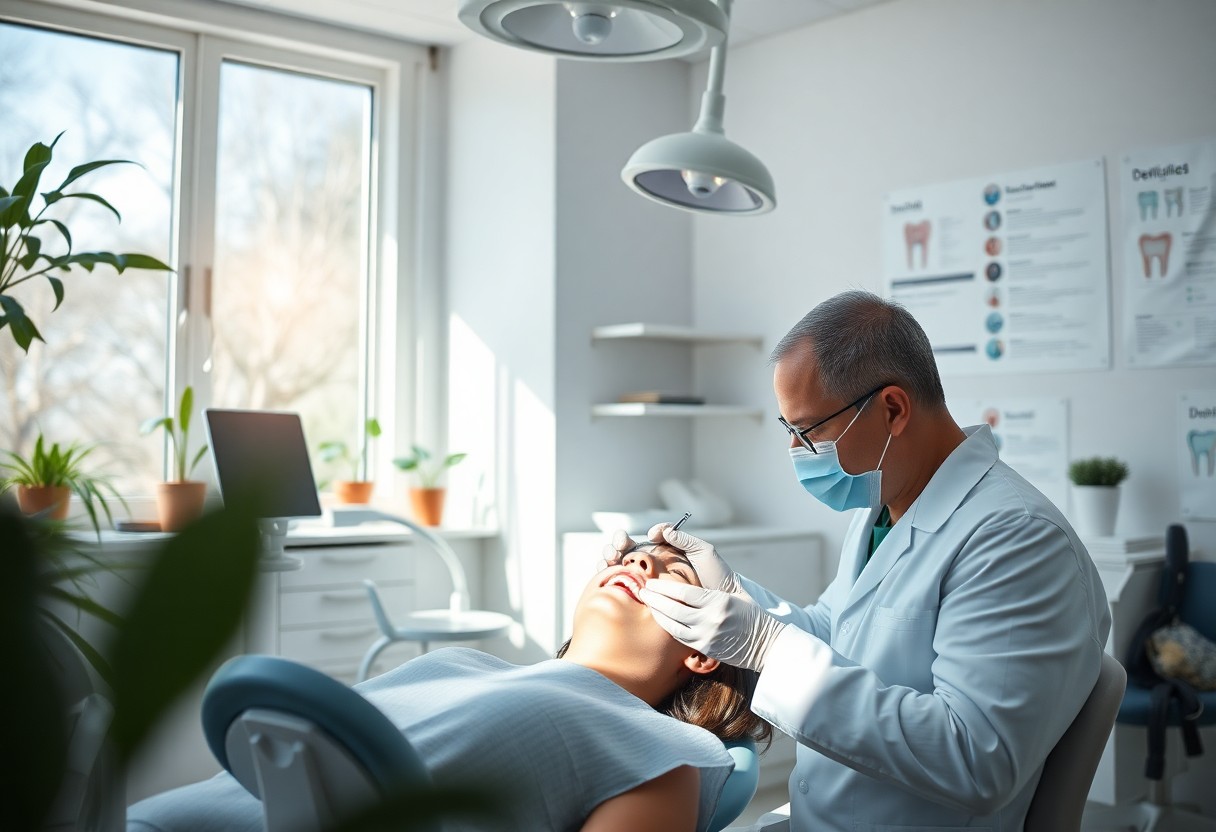Holistic Dentistry Explained – 8 Steps To Healthier Teeth And Gums
Just like you, I value the health of my teeth and gums and want to share my insights on holistic dentistry, which focuses on the interconnection between oral health and overall well-being. By adopting a holistic approach, you not only enhance your dental health but also reduce the risk of harmful chemicals often found in conventional treatments. In this guide, I’ll outline 8 imperative steps that promote healthier teeth and gums, emphasizing natural methods that you can easily incorporate into your daily routine for lasting benefits.
Key Takeaways:
- Integrative Approach: Holistic dentistry emphasizes the connection between oral health and overall well-being, considering physical, emotional, and environmental factors.
- Natural Materials: This dental practice prioritizes the use of biocompatible materials that are safe for the body, avoiding mercury fillings and other harmful substances.
- Preventive Care: Focus is placed on preventive measures, such as nutrition, proper hygiene, and regular check-ups, to maintain healthy teeth and gums.
- Oral-Systemic Connection: Holistic dentists acknowledge the link between oral health and systemic diseases, such as heart disease and diabetes, integrating treatment plans accordingly.
- Patient Education: Empowering patients through education about dental health, nutrition, and lifestyle choices is a key tenet of holistic dentistry.
- Minimal Intervention: The approach supports minimal invasive treatments and emphasizes healing the body naturally rather than relying solely on surgery and pharmaceuticals.
- Mind-Body Wellness: Mental and emotional factors are considered significant in achieving optimal dental health, promoting a holistic view of patient care.
What is Holistic Dentistry?
A holistic approach to dentistry goes beyond just treating the symptoms of dental issues; it encompasses the overall well-being of the patient. I believe that oral health is interconnected with the rest of the body, and holistic dentistry emphasizes the use of natural techniques and biocompatible materials to promote healing. In exploring this field, you might find valuable resources like Holistic Dental Care: The Complete Guide to Healthy Teeth …, which offers insights into how dental practices can support not just your smile but your holistic health as well.
Definition and Principles
One of the core principles of holistic dentistry is the belief that a person’s health status affects their dental health, and vice versa. This means that instead of merely addressing the tooth decay or gum disease, a holistic dentist looks at how lifestyle choices, nutrition, and emotional well-being might be impacting your overall dental conditions. This perspective allows for a comprehensive treatment plan that fosters long-term health and well-being.
Key Differences from Traditional Dentistry
By contrast, traditional dentistry often focuses primarily on the physical aspects of dental health, including the treatment of specific symptoms rather than addressing the broader health issues at play. In many cases, conventional methods may rely heavily on invasive procedures and synthetic materials for treatments, which may not align with a patient’s overall health goals. Holistic dentistry, however, promotes alternative treatments that are typically less invasive, incorporating practices such as guidance on nutrition, homeopathy, and breathing exercises.
Further, a holistic dentist also prioritizes the use of non-toxic and biocompatible materials, which means they avoid substances that could potentially harm your health. Traditional dental practices may sometimes utilize materials that can be dangerous or lead to long-term health complications. Emphasizing a more natural approach, holistic dentistry aims to create a synergy between treatments and your overall health, ensuring that every dental visit contributes positively to your well-being. This approach not only targets your immediate dental concerns but also considers how these issues relate to your overall physical health.


The Importance of Biological Materials
Even as we seek to achieve optimal oral health, we must pay attention to the type of materials used in our dental treatments. In holistic dentistry, the focus is on utilizing biologically compatible materials that promote healing while minimizing any risk of adverse reactions. This approach not only benefits my oral health but also supports the overall well-being of my body, ensuring that I am not inadvertently exposing myself to harmful substances that could compromise my immune system or contribute to systemic health issues.
When I choose dental materials that are free from common toxins, I am taking a decisive step towards a healthier mouth and body. The materials used for fillings, crowns, and other restorative procedures should ideally be made from natural or biocompatible substances, such as composites or ceramics, rather than materials that may contain heavy metals or other harmful agents.
Safe Dental Materials
Between the various options available, I find it necessary to understand which materials are safe and effective for dental procedures. For instance, using tooth-colored composite fillings not only provides an aesthetic advantage but also omits harmful additives present in traditional amalgam fillings. The beauty of holistic dentistry lies in the use of materials that align with both my health goals and my values regarding sustainability and natural living.
Moreover, I always prioritize sourcing materials from reputable dental practices that prioritize bio-compatibility and sustainability. This ensures a better overall outcome and reduces the risk of potential complications associated with inferior materials.
Avoiding Toxic Substances
With the growing awareness of the effects of chemicals, it is vital to be vigilant in avoiding substances that could be detrimental to my health. Many common dental materials contain toxic elements like lead, mercury, and BPA, which can leach into the body over time. It’s imperative for me to have open conversations with my dentist about the materials being used and how they align with my holistic health approach.
Further, I have come to understand that avoiding toxic substances not only impacts my dental health but also has a ripple effect on my overall well-being. By opting for dental products that are labeled non-toxic and safe for humans, I am actively participating in a holistic treatment plan that embraces natural healing. Additionally, I can choose dental hygiene products that are free from harmful additives, knowing I am doing my part to protect my body from potential harm while nurturing my smile.
Understanding the Connection Between Oral and Overall Health
Once again, I find it necessary to emphasize that your oral health is not just about having a bright smile. The mouth acts as a gateway to your body, and maintaining its health can significantly influence your overall well-being. When I examine this connection, I see that the health of your teeth and gums can reflect or even impact conditions throughout the body. Poor oral hygiene can lead to issues like infections, inflammation, and can even exacerbate pre-existing medical conditions. Hence, understanding this relationship becomes imperative for anyone invested in their long-term health.
In my journey in holistic dentistry, I have seen firsthand how oral health interacts with bodily functions. When you take care of your dental health, you are also contributing to your overall systemic health. For instance, healthy gums can help prevent bacteria from entering the bloodstream, reducing the risk of various systemic diseases. By recognizing the importance of your oral health, you create a foundation for a healthier, more vibrant life.
Systemic Effects of Oral Health
To truly appreciate the systemic effects of oral health, consider how oral bacteria can migrate into your bloodstream. This can elevate the risk of serious conditions such as heart disease and diabetes. When I work with patients, I often emphasize how a simple dental clean-up can be a preventive measure against larger health issues. By fostering better oral hygiene practices, you can significantly lower the chances of also battling systemic health challenges.
Moreover, poor oral health is not only a localized issue. It has the potential to lead to complications in areas such as respiratory health, where aspirations of oral bacteria can cause infections. Therefore, I urge you to think of your dental care as an integral part of your total health regimen, where each step toward improved oral health fosters better overall wellness.
Conditions Linked to Poor Dental Care
Health issues stemming from inadequate dental care can manifest in more ways than one. Conditions like heart disease, respiratory infections, and even cognitive decline have all been linked to poor oral hygiene. It’s fascinating how interconnected our body systems are—by taking care of your teeth and gums, you are not just investing in your smile but also in your overall health. I’ve seen numerous cases where treating gum disease has led to improvements in not just oral health, but also overall vitality.
Effects of poor dental care can be far-reaching, making it imperative to stay proactive. For example, a lack of proper oral hygiene can lead to chronic inflammation in the body, which is a precursor to numerous serious diseases. Furthermore, untreated cavities or gum disease can create an environment where bacteria thrive, potentially causing infections that extend beyond the mouth. Ultimately, maintaining your oral health is a key component in safeguarding against grave health concerns, realizing a holistic approach to your well-being.
Nutrition’s Role in Dental Health
For maintaining optimal dental health, I believe it’s imperative to understand the impact of nutrition on your teeth and gums. A balanced diet rich in vitamins and minerals plays a significant role in preventing dental issues. Foods such as leafy greens, nuts, and dairy products contribute to strong teeth and bones, while fruits like apples and berries offer imperative antioxidants that promote overall oral health. You might find it useful to explore Holistic Dental Care, The Complete Guide to Healthy … for deeper insights into how nutrition intertwines with holistic dental practices.
Foods for Healthy Teeth and Gums
Foods play a vital role in the health of your dental environment. Crunchy vegetables like carrots and celery are not only refreshing but also assist in cleaning your teeth naturally, acting as a scrub to remove plaque and debris. Incorporating foods high in calcium and phosphorus, such as yogurt and cheese, can help to remineralize your teeth, making them stronger and more resilient against decay.
Supplements and Their Benefits
Along with a well-rounded diet, certain supplements can provide significant benefits to your dental health. Nutritional supplements such as vitamin D and probiotics support the immune system and promote a healthy balance in the oral microbiome. I often encourage individuals to consider omega-3 fatty acids, which have been linked to reduced inflammation in the gums. These can be particularly beneficial if you experience gum disease or other inflammatory issues.
The idea of using supplements can be daunting, but I have found that their advantages can be transformative for your dental health. For instance, vitamin D supports calcium absorption, which means stronger teeth and bones, while probiotics help maintain an optimal balance of bacteria in your mouth, potentially reducing the risk of cavities and gum disease. It’s important to choose high-quality supplements, as the availability of nutrients in your body can be potentially impacted by poor-quality products. Always consult with a healthcare professional before starting any new supplement regimen.

Mind-Body Connection in Dental Care
Despite the common misconception that dental health is solely a physical matter, it is important to acknowledge the powerful connection between the mind and body when it comes to your oral health. Understanding this connection can lead to more effective dental care and promote a holistic approach. When your mind is at ease, you are more likely to take appropriate care of your teeth and gums. Conversely, stress, anxiety, and other emotional factors can significantly impact your dental hygiene practices, leading to an increased risk of dental problems.
Stress Management Techniques
At the heart of maintaining healthy teeth and gums is recognizing the impact of stress on your overall well-being. Stress can lead to habits such as teeth grinding, jaw clenching, and neglecting oral hygiene. To combat this, incorporating stress management techniques into your daily routine can be beneficial. Practices like mindfulness meditation, deep breathing exercises, and regular physical activity not only alleviate stress but also promote a healthier mental state that fosters better oral care habits.
The Impact of Emotions on Oral Health
Health issues are often intertwined with your emotional state, and the effects can extend to your mouth. Feelings of sadness, anxiety, or even fear can manifest in physical ways that impact your oral health. This includes an increased tendency to skip routines like brushing and flossing, which opens the door to plaque build-up and gum disease. It’s important to stay aware of how your emotions can subtly dictate your choices when it comes to dental care.
Care for your mental health as passionately as you would for your teeth. Emotional turmoil can lead to negative outcomes such as increased inflammation and a higher likelihood of developing gum disease. It’s important to find effective outlets for stress, such as engaging in hobbies, spending time with loved ones, or practicing therapy techniques. Keeping your stress levels in check might just be as significant as maintaining a regular brushing schedule for keeping your oral health in tip-top shape.
Preventative Practices for Holistic Dental Care
Unlike traditional dentistry, which often focuses on treating issues after they arise, holistic dental care emphasizes the importance of preventative practices to maintain your oral health. This approach not only involves routine dental visits but also integrates a variety of lifestyle choices that can enhance both your oral and overall health. By understanding and implementing these preventative measures, I can help ensure that my teeth and gums remain healthy, thereby allowing me to avoid more invasive treatments down the line.
Regular Check-ups and Maintenance
After committing to a holistic approach, one of the key elements is to schedule regular check-ups with a holistic dentist. These professionals employ minimally invasive techniques and often utilize biocompatible materials that align with your overall health goals. These check-ups allow the dentist to monitor your oral health closely, providing timely interventions before problems escalate, ensuring a sustainable dental health regimen tailored to your needs.
At-home Care Strategies
Around the clock care is necessary for keeping your teeth and gums healthy. This indicates that your oral hygiene practices at home should be consistent and thorough. Using natural toothpastes and flossing regularly can significantly contribute to your oral health. Moreover, I should consider incorporating rinses with herbal solutions known for their antibacterial properties to maintain gum health and reduce inflammation.
In fact, adopting a dedicated daily routine that includes brushing twice a day with fluoride-free toothpaste, flossing regularly, and using a mouthwash with natural ingredients can greatly enhance your dental hygiene. Pairing these practices with a diet rich in vitamins and minerals can also bolster your body’s defenses against cavities and gum disease. A well-rounded approach in your at-home care strategies allows you to take an active role in sustaining your dental health.
Conclusion
Conclusively, engaging with holistic dentistry can fundamentally enhance your oral health and overall well-being. By adopting the eight steps outlined, you empower yourself to take control of your dental care in a way that is aligned with both modern science and the natural principles of health. I encourage you to explore these practices further, identifying how they can seamlessly integrate into your daily routine for healthier teeth and gums. The journey to wellness is personal, and each step you take can yield remarkable benefits.
As I have shared these strategies, I invite you to actively participate in your own health narrative. By prioritizing clean nutrition, mindful dental products, and a stress-free lifestyle, you set a strong foundation for long-term oral health. Ultimately, your smile is a reflection of your inner vitality, and by choosing a holistic approach, you not only enhance your dental health but also promote an enriched and balanced life. Let’s begin on this transformative journey together, for the health of your teeth, gums, and entire body.
FAQ
Q: What is holistic dentistry?
A: Holistic dentistry, also known as biological or alternative dentistry, focuses on the whole person rather than just the symptoms related to oral health. It emphasizes the connection between dental health and overall well-being, utilizing natural and biocompatible materials while considering the effects of dental treatments on the entire body.
Q: What are the main principles of holistic dentistry?
A: The main principles of holistic dentistry include treating the patient as a whole, using biocompatible materials, avoiding toxic substances, promoting preventive care, employing natural remedies, and fostering a supportive and empowering patient experience. This approach seeks to address not just dental issues but also the lifestyle factors that contribute to oral health.
Q: How can I maintain healthier teeth and gums through holistic practices?
A: To maintain healthier teeth and gums, consider incorporating a balanced diet rich in whole foods, reducing sugar intake, practicing good oral hygiene, using natural dental products, and staying hydrated. Regular visits to a holistic dentist can also help monitor your oral health and provide personalized care recommendations.
Q: What are some natural remedies used in holistic dentistry?
A: Common natural remedies used in holistic dentistry include imperative oils like tea tree oil for their antimicrobial properties, coconut oil for oil pulling, and herbal rinses containing ingredients like sage and chamomile for soothing swollen gums. Additionally, using xylitol-based products can help inhibit harmful bacteria in the mouth.
Q: Are there specific diets that support oral health in holistic dentistry?
A: Yes, diets that support oral health in holistic dentistry often emphasize whole, unprocessed foods, fresh fruits and vegetables, healthy fats, and lean proteins. Foods rich in vitamins C and D, calcium, and phosphorus are particularly beneficial for maintaining strong teeth and healthy gums. Limiting processed sugars and carbohydrates can also play a significant role in oral health.
Q: How can holistic dentistry address concerns about traditional dental procedures?
A: Holistic dentistry often seeks to address concerns about traditional dental procedures by offering alternatives to conventional treatments. This may include using biocompatible materials for fillings and crowns, minimizing the use of anesthesia, and employing techniques that promote healing without harsh chemicals. Furthermore, holistic dentists prioritize patient education and informed consent in decision-making.
Q: What should I expect during a visit to a holistic dentist?
A: During a visit to a holistic dentist, you can expect a comprehensive assessment that looks beyond oral health symptoms. The dentist will typically take a thorough medical history, discuss lifestyle factors, and may perform diagnostic tests that assess overall health. Treatment plans are usually personalized, focusing on prevention and conservative approaches while discussing any materials and methods used in your care.




